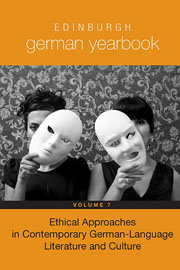 Edinburgh German Yearbook 7
Edinburgh German Yearbook 7 Published online by Cambridge University Press: 05 December 2013
InStimme eines Vogels, delivered as the first of her poetry lectures at Tübingen in 1998, Yoko Tawada comments on the particular status—and strangeness—of the human voice when speaking another language. Suggesting that the human subject spits out foreign words as though they were birds, Tawada underlines the tension between the materiality of the foreign sentences with their clear contours, on the one hand, and the odd displacement of the voice in a different language, on the other. Published under the title Verwandlungen, the three Tübingen lectures explore literary and linguistic metamorphoses, and particularly focus on those that occur when the human subject engages with another language, when dislocation is felt particularly acutely. Tawada's reflections on the ambivalent status of the foreign voice lead her to conclude: “Wer mit einer fremden Zunge spricht, ist ein Ornithologe und ein Vogel in einer Person.” To consider the ethical concern driving Tawada's expressive project, this chapter takes as its starting point her identification of the linguistic outsider's voice as a vehicle of both material immediacy and critical detachment. This essay is not concerned to explore ethics as a branch of philosophy, but to examine Tawada's ethically committed aesthetic practice and her experimentation with the position of the bilingual subject as a means of refiguring cultural hierarchies and binary oppositions. Focusing on literary representations of the voice as a phenomenon distinct in Tawada's writing, I do not suggest that the texts are predominantly concerned with ethical tensions and moral dilemmas. Rather, I understand ethics more broadly as a set of moral principles relating to issues of social responsibility and human justice. These issues are intrinsically bound up with the linguistic figuration of the subject and its relationship with its others.
To save this book to your Kindle, first ensure [email protected] is added to your Approved Personal Document E-mail List under your Personal Document Settings on the Manage Your Content and Devices page of your Amazon account. Then enter the ‘name’ part of your Kindle email address below. Find out more about saving to your Kindle.
Note you can select to save to either the @free.kindle.com or @kindle.com variations. ‘@free.kindle.com’ emails are free but can only be saved to your device when it is connected to wi-fi. ‘@kindle.com’ emails can be delivered even when you are not connected to wi-fi, but note that service fees apply.
Find out more about the Kindle Personal Document Service.
To save content items to your account, please confirm that you agree to abide by our usage policies. If this is the first time you use this feature, you will be asked to authorise Cambridge Core to connect with your account. Find out more about saving content to Dropbox.
To save content items to your account, please confirm that you agree to abide by our usage policies. If this is the first time you use this feature, you will be asked to authorise Cambridge Core to connect with your account. Find out more about saving content to Google Drive.